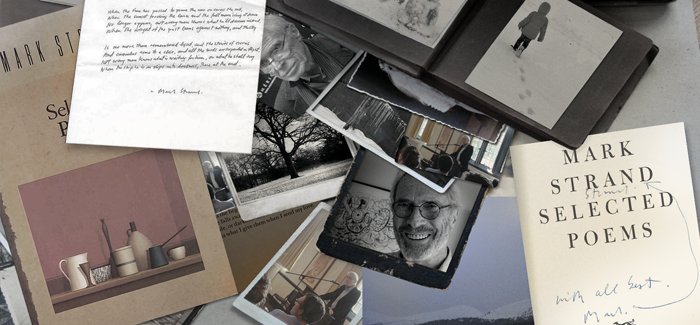
(Collage by Joy Olivia Miller, created with photography by Lydialyle Gibson as well as public domain and CC BY 2.0 imagery from various sources, including Jeff Meyer, W. T. Pfefferle, Eggrole, Nerovivo, Miss Krin, Guillermo, Dissolve, Michael Hartford, Chris Drumm, and Casa de América)
The death of poet Mark Strand inspires reflections on his work’s enduring, personal impact.
Mark Strand was always my winter poet. All that absence and negation, the sense of time past, the frozen ground and the white moon, and the always ever presence of death—sometimes droll or doting or dreamlike, but never far away. “To stare at nothing is to learn by heart / What all of us will be swept into,” Strand wrote, “and baring oneself / To the wind is feeling the ungraspable somewhere close by.” So when the temperature would drop and the early dark would set in, I’d turn to “Always” or “Lines for Winter” or “The Idea” or “A Piece of the Storm.”
Strand died this past November. Reading him in the weeks and months afterward, as another winter deepened, I thought of the last time I saw him speak, in October 2013 in a packed room on the first floor of Classics Hall. A former professor in the Committee on Social Thought, Strand had returned to campus to give a reading and a lecture. What I remember most from that day was his searching discussion of the slight and deceptively mundane “No meio do caminho” (“In the middle of the road”) by Brazilian poet Carlos Drummond de Andrade. Its ten lines had fascinated and flummoxed Strand since he first encountered the poem 1965 as a 31-year-old poet newly arrived in Rio on a Fulbright scholarship, feeling slightly out of his depth. He talked about the poem’s stubbornness, its “restorative” repetitions, its echo of the first line of the Divine Comedy: “‘No meio do caminho’ is as close as one can imagine,” Strand said, “to ‘Nel mezzo del cammin.’” (In English, Dante begins, “Midway along our life’s path, I woke to find myself in a dark wood …”; Drummond’s first line translaters to: “In the middle of the road there was a stone.”) But it was clear that parts of the Drummond poem still refused interpretation for Strand, still felt mysterious and unresolved, even awkward.
In the Q&A that followed the talk, poet Rosanna Warren, a current Social Thought professor, offered up a sliver of illumination, pointing out that the poem’s first two and last two lines were mirror images of each other, a chiastic structure that turned the poem in on itself, sealing it off. “So that’s a sort of self-enclosed world,” Warren said. Strand’s eyes widened a little, and the air in the room shifted. “That’s a really good observation,” he said finally. “One I hadn’t made.” After 48 years with this poem, here was a fresh surprise, a new burst of clarity. The exhilaration was palpable.
A few days ago, going back and looking over my notes from that afternoon, I discovered another moment that I hadn’t remembered at all, one which in retrospect is haunting. Toward the end of his talk, Strand described the experience of leafing through a new book of Spanish translations of his poems—many of them more oddly familiar to him, he said, than the younger self who had written them—and coming across one poem whose existence he’d completely forgotten. “In fact,” he said, “I thought a mistake had been made.” The translator assured him it was his; it had come from his book The Late Hour. After the launch party, Strand went home and looked for the poem. “There it was, unmistakably mine.” But by the time he spoke at UChicago ten months later, the poem had once again slipped into oblivion, he said. “I think back and try to recall the poem, and I cannot. Not the title, nor a single phrase, nor what it is about. Nothing, except that I once wrote something and believed it was good enough to include in a book, one in which it turns out there were other so-so poems.” Its erasure from memory had become its peculiar survival: being remembered for being forgotten. To Strand, that seemed fitting, sufficient. “Since I once stated in an early work that wherever I am, I am what is missing, it should not be surprising that a poem whose existence I doubted should be more present simply by not being present.”
Later, a young woman in the back of the room raised her hand. “When you talked about your forgotten poem and the strangeness of confronting it,” she said, “it reminded me of—it’s like confronting the world without yourself in it. You have a relationship to all your poems and they’re yours, but when you’ve forgotten them, that’s how the poem will be when you’re not around anymore.”
There was a moment’s pause, and then Strand said, “I can see that.”
